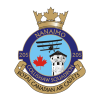Seven determined cadets completed the National Ground School Program (NGSP) and wrote the Qualifying Exam (QE) on February 2, 2025, paving their path to soar in the air.
The NGSP is a free, online ground school opportunity for Air Cadets, guiding them toward the Powered Pilot Training Course (PPTC) or the Glider Pilot Training Course (GPTC) during the summer. These training programs empower Air Cadets to earn their wings as Transport Canada-qualified Private Pilots or Glider Pilots.
The NGSP provides the knowledge for the Qualifying Exam, an essential step toward proceeding with the selection process for the PPTC/GPTC courses. With a blend of online lectures, recorded sessions, self-study materials, and a supportive Q&A forum with live instructors, the NGSP provides a robust learning environment, supporting cadets and giving them a foundation as they prepare for their future as pilots.
The following 205 Collishaw cadets completed the course and the Qualifying Exam.
- FSgt Potgieter, M
- FSgt Jenkin, D
- FCpl Mann, L
- LAC Kim, M
- Sgt Waugh, A
- Sgt Matthews, T
- Sgt Dipietrantonio, J
These cadets enrolled in the NGSP in October 2024 and showed remarkable commitment. 205 Collishaw cadets are very fortunate to have an additional in-person Ground School option on Friday nights, which compliments the mandatory online sessions and can be taken multiple times. This extra option allows them to engage with the aviation ground school material at their own pace.
Their dedication to learning is inspiring and highlights the personal growth achievable through the NGSP, which will serve them well in their future endeavors, particularly in aviation.
According to FCpl Mann, the most challenging aspect of the course was managing the time commitment. Participants needed to allocate about three hours per week for the online course, in addition to study time, which required effective time management to fit it into an already busy schedule. “It was manageable, though. Taking notes was helpful, and attending Friday Ground School made a significant difference. I would definitely recommend the Ground School to anyone interested in the future, as it lets you revisit and build on the material,” FCpl Mann suggested.
The next step is a selection process involving the Review Board made up of members from the Air Cadet League and Canadian Air Force. They will interview candidates and evaluate the QE marks, Air Cadet resumes, and school grades before offering selected cadets an opportunity to earn their wings, with all expenses covered. This process is designed to identify the most dedicated and promising cadets, ensuring that those selected are fully prepared for the responsibilities and challenges of pilot training. “I can’t say enough about their achievement. It just shows what kind of awesome young people we have in cadets,” Captain Hills.
Cadets who are 16 by September 1 of the year they take the course and have completed Level 3 can apply for glider pilot training. For the PPTC, cadets must be 17 by September 1 of the year they take the course. “It’s a big commitment. Along with school and cadet activities, it requires dedication, but the reward is awesome if you want to fly and earn your wings as a cadet,” Captain Hills added.

So, what does it lead to?
WO1 Moore had completed the Pilot Training Course (PPTC) in the summer of 2024. Now a 18-year-old private pilot with aspirations of joining the Canadian Air Force, he shares his advice: “If you are passionate about aviation, make sure to sign up for aviation-related summer camps. Gaining that experience early will really help you out when you apply for pilot training.” WO1 Moore
Any cadets interested in flying should speak with Captain Hills or WO1 Moore.

Author Olivia Joo





